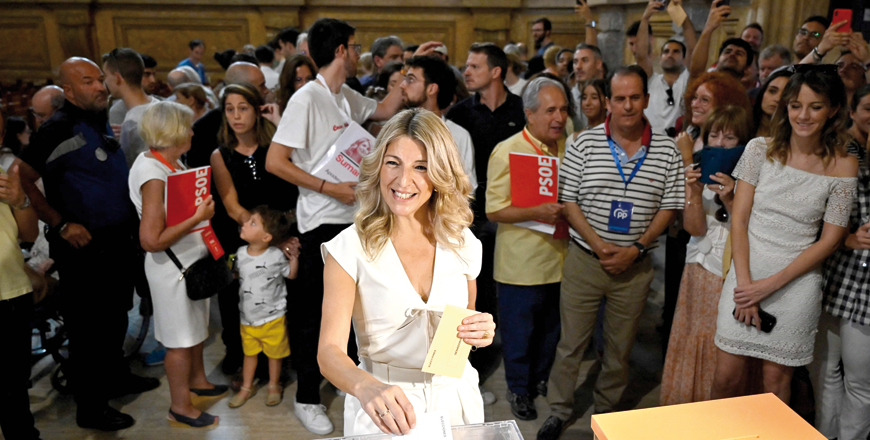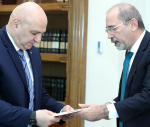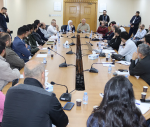You are here
Left-wing separatist Bildu eyes historic win in Basque vote
By AFP - Apr 22,2024 - Last updated at Apr 22,2024
MADRID — Spain’s northern Basque Country votes Sunday in a regional election that polls suggest will be won by the left-wing separatist coalition Bildu, seen as the heir of the political wing of the defunct armed separatist group ETA.
The outcome could leave Prime Minister Pedro Sanchez’s ruling Socialist Worker’s party in the difficult position of having to decide between two key parliamentary allies.
Surveys predict a victory for EH Bildu, which groups several parties including the Basque socialist Sortu Party. Bildu is seen as the heir of the political wing of ETA, the now defunct armed separatist group whose bloody campaign for an independent Basque homeland claimed 850 lives before it rejected violence in 2011.
With a large following among young people thanks to its strong stance on social issues, EH Bildu has climbed steadily in the polls and now looks set to win the most votes in Sunday’s election, inching ahead of the centrist Basque Nationalist Party (PNV) that has ruled the region for almost 44 years with only a brief three-year pause.
“Before, the only party looking after Basque interests was the PNV, so everyone voted for them regardless of their political leanings,” 40-year-old social worker Elena Garcia, 40, told AFP in Bilbao, saying the ETA era was now well in the past.
“But now if you are left-wing and more socially minded, you will vote for Bildu,” Garcia added.
Socialists as kingmaker
Polls show it will be a tight race with neither party set to win an absolute majority, leaving the regional branch of the Socialist Party as kingmaker.
Sanchez’s Socialist-led government relies on key support from a network of regional allies, including both the PNV and Bildu, to govern, meaning the decision could cost him.
But Eurasia Group analyst Federico Santi said it was “unlikely that the result of the election would threaten the stability of [Sanchez’s] government”.
Until now, the PNV has governed the Basque Country in coalition with the Socialists, whose regional leader has already ruled out supporting Bildu. The latter’s leader, Arnaldo Otegi, was convicted of ETA membership but later credited with helping steer the group away from violence.
“Condemning terrorism is [Bildu’s] outstanding debt to Basque society and as long as they do not do that... we will not make any type of deal with them,” the Socialist candidate Eneko Andueza told public radio.
But the issue hardly came up until earlier this week when Bildu’s candidate for regional leader, Pello Otxandiano, sparked a backlash after he failed to call ETA a “terrorist organisation”, referring to it only as an “armed group”.
“Even if Bildu wins, it will not be able to govern because no party will be willing to make an alliance with it,” said Pablo Simon, a political scientist from Madrid’s Carlos III University.
A wealthy region
Some 1.8 million voters are eligible to cast their ballots to choose the regional parliament’s 75 lawmakers as polls open at 9:00am (07:00 GMT) on Sunday. Polling stations close at 8:00 pm.
With 2.2 million residents, the Basque Country has the second highest regional income per capita in Spain, after Madrid, which averages around 36,000 euros ($38,400). Its economy accounts for 5.9 per cent of Spain’s gross domestic product, ranking fifth of Spain’s 17 regions, Caixabank research figures indicate.
It is also the region with the lowest unemployment figure in Spain at 7.9 per cent, according to Basque government figures.
The father of Basque nationalism was Sabino Arana, who set up the PNV in 1895. His ultra-Catholic, anti-Spanish ideology grew out of his vehement opposition to the thousands of Spaniards flocking to the area as a result of the industrial revolution.
ETA emerged in 1959 out of a split within the PNV’s youth movement who were angered by what they saw as the party’s inability to stand up to the Franco regime.
In its first recorded act of bloodshed, ETA militants shot dead a policeman on June 7, 1968 in the city of Villabona, according to Spanish interior ministry documents.
Related Articles
MADRID — Spain voted on Sunday in an early general election in which the conservative Popular Party (PP) was tipped to beat Prime Minister P
NÁQUERA, Spain — The rainbow flags were the first to go when the far-right seized power in Naquera, an ultraconservative town in eastern Spa
MADRID — Spaniards were voting on Sunday in local and regional polls seen as a barometer for a year-end general election which surveys sugge
















